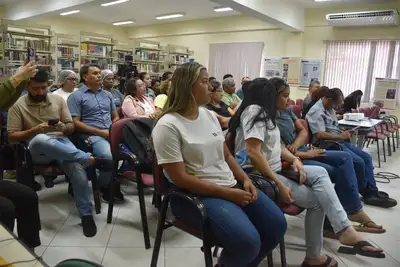Abelardo Santos Hospital modernizes physiotherapy treatment in the ICU with virtual reality
Virtual environments stimulate exercise practice and reduce anxiety and stress during hospitalization
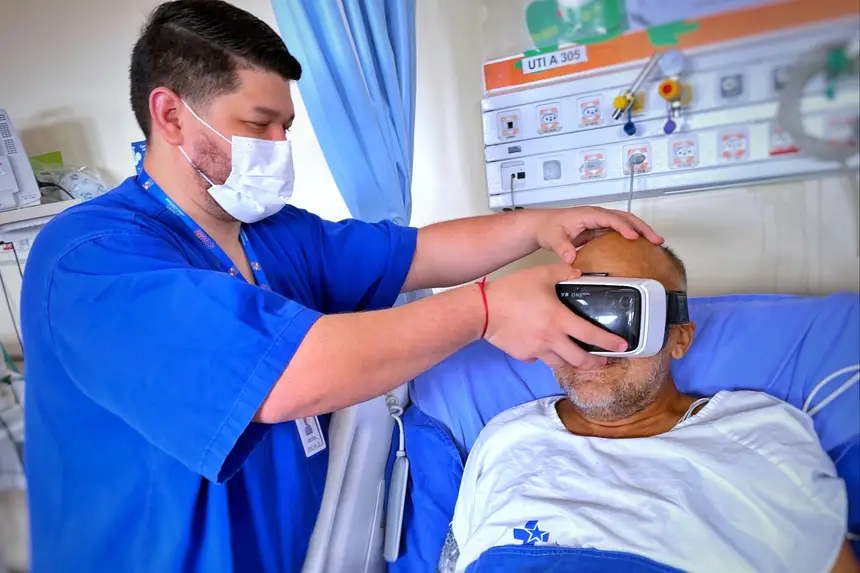
The Intensive Care Units (ICUs) of the Dr. Abelardo Santos Regional Hospital (HRAS), in Icoaraci, a district of Belém, now have a new ally in the rehabilitation process: virtual reality (VR) glasses. The technology provides an immersive experience that complements medical and physiotherapeutic care, with both physical and emotional benefits for patients.
“You even forget that you are in a hospital environment when you put on the glasses. You leave one place and go to another. It’s a very good experience that makes treatment more peaceful and helps us relax during rehabilitation procedures, which, in some cases, are not easy. I liked it. It’s approved,” reported the self-employed Max Brito, 51, hospitalized after complications from diabetes.
According to the physiotherapy team responsible for conducting the treatment, the goal is precisely what the patient described: to stimulate physical exercise and transport users to a tranquil environment. This approach not only improves emotional state but also reduces the need for sedation, promotes a quick and less traumatic recovery, the professionals assure.
Pain relief
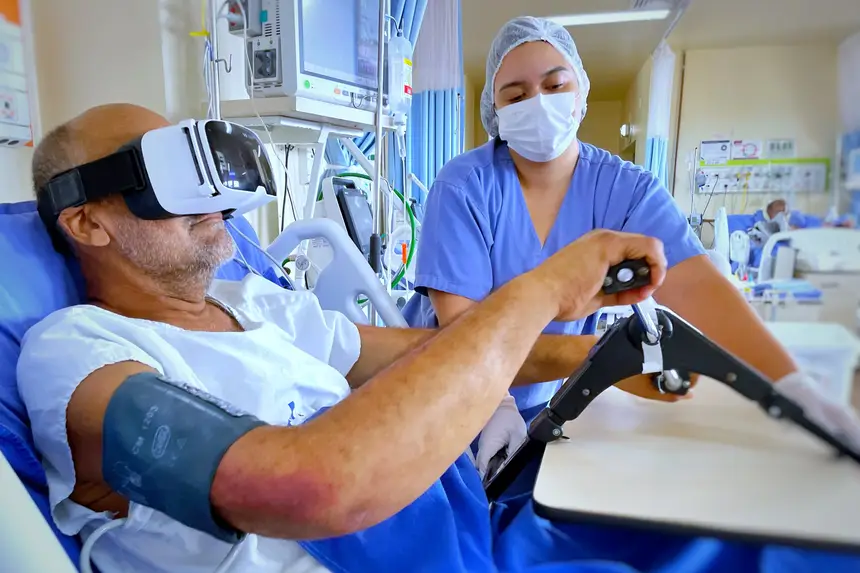
Hospitalized to treat a neural stroke, 30-year-old Edison Silva from Tomé-Açu, in the northeastern region of Pará, experienced the technological resource for the first time. “I have been to other hospitals and this was a novelty for me. I think it’s important when the team seeks alternatives like this to improve the patient experience and speed up recovery. Congratulations to everyone,” he emphasized.
The patient also highlighted that during the procedure, he did not feel pain, unlike previous sessions. Physiotherapist Thiago Sobral explained how the glasses work in this process: “The main factor is the technology's ability to divert attention from what causes discomfort during the session. Additionally, the reduction of anxiety and stress also helps to lessen the perception of pain.”
Thiago emphasizes that virtual reality allows simulating situations and movements that are difficult to reproduce in the real environment. This immersion, according to him, aids in improving motor and cognitive coordination. “In fact, there are recent studies that prove this effectiveness in the rehabilitation process, motivating adherence to treatment, improving brain plasticity, and reorganizing neural activity.”
“These virtual environments created by the glasses make the rehabilitation process lighter, and this can be confirmed in our patients' reports,” highlights the physiotherapist, who concludes: “With this, we manage to reduce the common monotony during the hospitalization period. So much so that we even notice the patients' desire to participate in new sessions after observing the positive results.”
Humanization
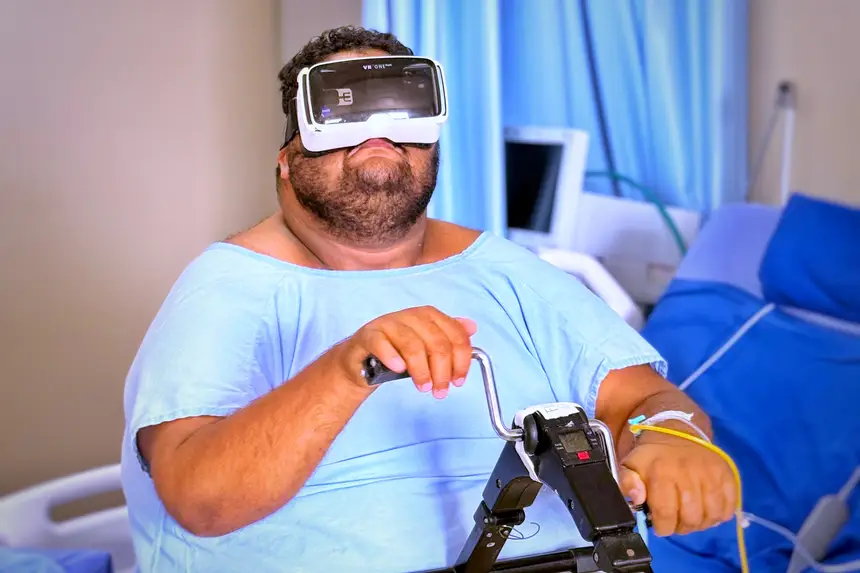
The use of virtual reality (VR) glasses in the ICUs complements other humanized practices that are part of the care routine at Abelardo Santos Hospital, which places the patient at the center of care. These initiatives are the result of qualified management carried out by the Social Institute Mais Saúde (ISMS), with the support of the Pará State Department of Public Health (Sespa).
One of the recognitions of this management was achieved this year when HRAS obtained, for the first time in its history, the Accredited – ONA 1 certification, one of the most important in Brazil. The seal attests to the quality of the services provided and confirms that the unit meets the fundamental safety criteria, ensuring processes that reduce risks and prevent harm to patients.
For the coordinator of the ICUs at HRAS, Samara Silva, investing in technology and innovation is investing in quality of life. “At Abelardo Santos Hospital, we believe that every initiative that unites science, empathy, and care makes a difference in our patients' recovery. Virtual Reality is further proof that care and technology can walk together in favor of health and humanization,” she pointed out.
Abelardo Santos Hospital is the largest public health unit of the Government of Pará, with a total of 360 beds. In the ICUs, where the treatment with virtual reality glasses is applied, there are 40 beds in the Adult ICU, 20 in the Neonatal ICU, and 10 in the Pediatric ICU, in addition to 15 beds in the Conventional Intermediate Care Unit (UCINCO) and 5 in the Kangaroo Intermediate Care Unit (UCI).
What can be seen in the virtual reality (VR) glasses
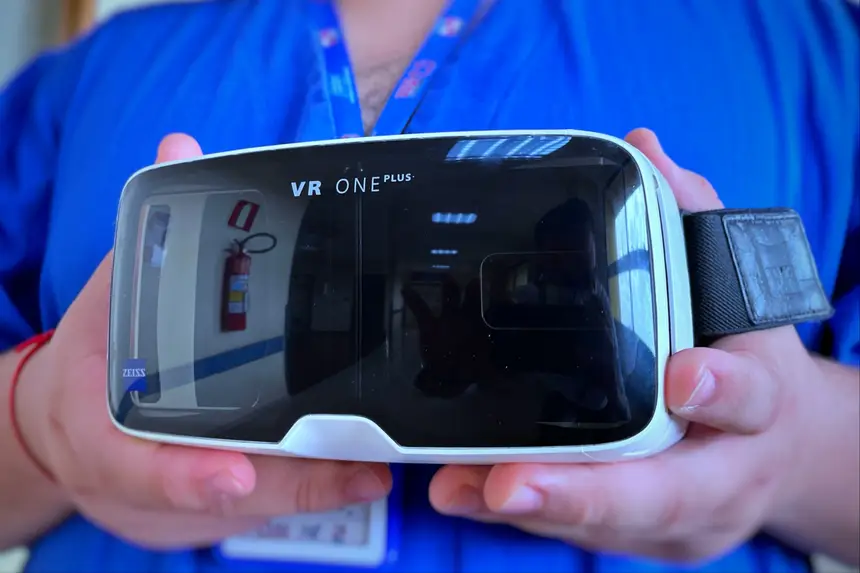
Walks through natural environments: this way, patients can walk through wooded trails, beaches, and flowered fields, with relaxing sounds of nature. These landscapes reduce stress even within the ICU.
Guided relaxation: in some situations, there are guided meditations and breathing exercises. The experience helps control anxiety and improve the response to treatment.
Movement simulations: the virtual environment can reproduce everyday situations, such as cycling, climbing stairs, or walking in parks, which helps in muscle rehabilitation and motor relearning in a motivating way.



